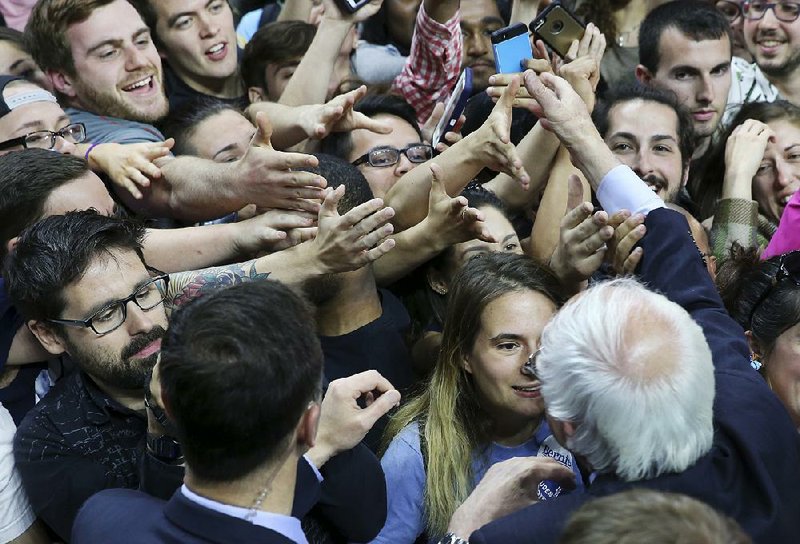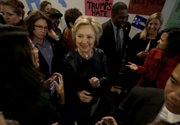WASHINGTON -- Donald Trump, the presumptive Republican presidential nominee, says he is all for uniting the party but that the many GOP officials he has branded losers and lightweights will have to fall in line because the voters have spoken.
FULL ELECTION COVERAGE
Trump's strident rhetoric, in television interviews and campaign rallies over the weekend, are characteristic of his outsider campaign. But his latest verbal lashings, after becoming the presumptive nominee last week, also suggest a candidate increasingly isolated from the very leaders he might need to support him ahead of a tough November election.
And if elected, Trump would need their help in pushing his agenda through Congress.
For now, Trump is brushing off rejections by influential GOP officials and saying the party doesn't have to be unified "in the traditional sense."
"Look, I'm going to get millions and millions of votes more than the Republicans would have gotten" otherwise, he said.
Trump also complained that he was "blindsided" by House Speaker Paul Ryan's refusal to endorse him. Trump said Ryan, R-Wis., had called him three weeks ago, after winning the New York primary on April 19, to congratulate him and that the two had a friendly exchange.
A Ryan spokesman said that phone call never happened. Trump spokesman Hope Hicks countered that "Ryan disputed the time of the call, not the call itself." She added, "I believe this took place in late March."
Trump and Ryan plan to meet in Washington on Thursday. Ryan is on tap to be chairman of the GOP convention in Cleveland in July and would be considered by most politicians as a crucial ally.
Trump said his message to Ryan will be simple.
"I'm going to say, 'Look, this is what the people want,'" Trump said.
The businessman is sending a clear message about party critics who are withholding support or planning to skip the convention.
He used the term "lightweight" to describe Sen. Lindsey Graham, R-S.C., once in the presidential race, and suggested former Florida Gov. Jeb Bush, another former rival, was still licking his wounds from the vicious campaign.
The party's 2012 nominee Mitt Romney, Trump said, "blew the election" that year and never even thanked Trump for his work on Romney's behalf.
Sen. John McCain of Arizona, the 2008 nominee, said it would take a lot for him to ever stand on stage next to Trump, even though McCain has agreed to support the party's nominee. Last July, Trump said McCain -- a Navy pilot during the Vietnam War who was captured after his plane was shot down and was held for more than five years -- was a "war hero because he was captured. I like people who weren't captured."
"There's always wounds in spirited political campaigns," McCain said in a TV interview. "But frankly, I have never seen the personalization of a campaign like this one, where people's integrity and character are questioned."
McCain said what Trump said about him is "fine. I don't require any repair of that." But, he added, "There's a body of American heroes that I would ... like to see him retract that statement, not about me, but about the others."
Sen. Jeff Flake, a Trump critic, said Republicans must figure out something fast because Trump's ability to win primary contests by relying on hard-line policies such as banning Muslims from entering the United States might not translate into general election success against the Democrats.
"If Republicans want to win, and we do, then we've got to change the approach because we're not going to win taking these positions," said Flake, a Republican from Arizona.
Trump adviser Paul Manafort suggested the Republican establishment was surprised by the candidate's rapid rise and therefore has been slow to rally behind him.
"There's a lot that unites the leadership in the Congress as well as Donald Trump," Manafort said. "But the important thing to remember is the national titular head of the party is the nominee of the Republican Party. He just won that overwhelmingly, faster than anybody in Washington thought and running as an outsider against Washington."
Also Sunday, Trump said his chief economic concern is giving the middle class a sizable tax cut, while other proposals, including lowering taxes on businesses and the wealthy, were starting points for negotiation.
Trump outlined his tax proposals, including an effort to simplify the tax code, in September. Among other proposals, the plan promised that no business, from a mom and pop store to a Fortune 500 corporation, would pay more than 15 percent of their business income in taxes. The plan also aimed to not add to U.S. debt or the deficit.
Trump allowed that "by the time it gets negotiated, it's going to be a different plan."
The candidate said he would "make sure the middle class gets good tax breaks" but he suggested that political realities may make cuts for the rich harder to deliver. "When it comes time to negotiate, I feel less concerned with the rich than I do with the middle class."
"For the wealthy, I think, frankly, it's going to go up," Trump said. He didn't specify whether that meant from current levels, or from the rates included in his 2015 plan, although on ABC he said that "on my plan they're going down. But by the time it's negotiated, they'll go up."
Trump appeared on ABC's This Week and NBC's Meet the Press. Former Alaska Gov, Sarah Palin and McCain were on CNN's State of the Union, Manafort was interviewed on Fox News Sunday and Flake was on NBC.
Clinton email inquiry
On the Democratic side, front-runner Hillary Clinton said Sunday that the FBI had not asked to interview her as part of its inquiry into her use of a personal email server as secretary of state. But she reiterated on CBS' Face the Nation that she would make herself available to law enforcement officials as necessary.
The investigation into Clinton's email practices and her handling of classified intelligence has shadowed her presidential campaign.
Clinton said that no meeting had been requested or scheduled.
"No one has reached out to me yet," she said, adding, "I made it clear that I'm more than ready to talk to anybody, anytime, and I've encouraged all of my assistants to be very forthcoming."
As she has done in the past, Clinton said she had erred in setting up a private email server but said she "always took classified material seriously."
But Clinton also sought to turn around the scrutiny she was facing, arguing that it was time for the Trump to face similar examination. Trump, she noted, had not released his tax returns, as is customary for presidential candidates.
Trump has said he is being audited and that it would be improper to release his taxes until that process is complete.
That explanation, Clinton said, "just by any analysis, doesn't hold up."
Clinton will return to primary campaigning Tuesday in Kentucky, with a visit to a child care center and a family health clinic. Kentucky holds its Democratic primary on May 17, and Clinton's rival, Sen. Bernie Sanders of Vermont, is favored there.
Anticipating the Democratic nomination, Clinton also said Sunday that she sees "a great role" for Sanders and his supporters in a "unified party," even as she said she welcomed Republicans who are not supporting Trump.
Days after Trump's remaining Republican competitors exited the race, Clinton continued to battle for her party's nomination against Sanders, who has taken several positions to her left on economic issues.
"Obviously I'm reaching out to Democrats, Republicans, independents, all voters who want a candidate who is running a campaign based on issues," Clinton said on CBS.
Clinton said she and Sanders have similar views on issues, including raising the minimum wage and reining "in bad actors on Wall Street and in corporate America." She said she wants to unify Democrats around those issues.
"I see a great role and opportunity for him and his supporters to be part of that unified party to move into not just November to win the election against Donald Trump, but to then govern based on the progressive goals that he and I share," she said.
Sanders has said he will remain in the race until the end of Democratic voting next month.
Polls open Tuesday in West Virginia for the Democratic and Republican primaries and in Nebraska for the Republican primary.
Information for this article was contributed by Anne Flaherty of The Associated Press; by Alexander Burns of The New York Times; by Ben Brody of Bloomberg News; and by Anne Gearan and Scott Clement of The Washington Post.
A Section on 05/09/2016


